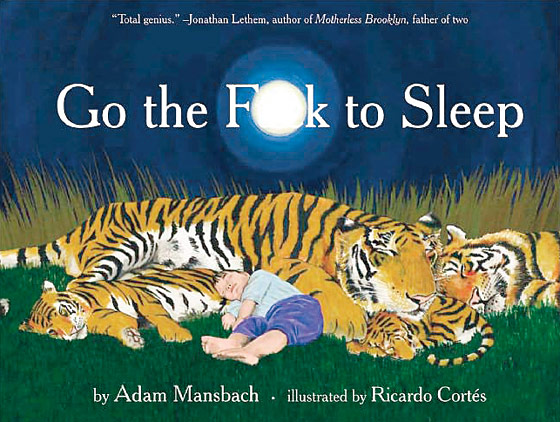
There’s a reason that the No. 1 title on Amazon last week was a still-unpublished rhyming picture book called Go the Fuck to Sleep—a Facebook gag turned PDF samizdat turned publishing sensation. Or there are two reasons, interrelated. The straightforward, surface one is that it’s accurate: “I know you’re not thirsty. That’s bullshit. Stop lying. / Lie the fuck down, my darling, and sleep.”
Below that, the appeal gets more complicated. “No-guilt funny,” one cover blurb says. No guilt? It’s made out of guilt. I had to wait till the kid was in bed before opening the PDF, for fear he’d spy it onscreen and start reading, drawn in by the familiar flattened paintings (echoing Clement Hurd’s landscapes in The Runaway Bunny) and neat stanzas of short words. Easy, four-letter words. What are you supposed to do with the published object in your home? “Fuck your stuffed bear, I’m not getting you shit.” Yeah, no. This is a big person’s liberation fantasy, and it is not for sharing.
Mommy or Daddy, like a picture book, is something that the child believes exists for the child, in full. This is why bedtime is fraught with tension—it’s when adult time begins. At least, if you have the authority to pull it off. Otherwise, here comes the patter of little feet, right during the blood-spattered opening reel of the Hong Kong gangster movie you’ve just settled in to enjoy: “I think there’s a bug in my room.”
The nightly standoff runs through masterpieces of children’s literature, the kind written for actual children. The baby rabbit in Goodnight Moon is clearly stalling (“Goodnight nobody” … “Goodnight air”). Marvin K. Mooney Will You Please Go Now! turns it into Beckettian abstract dispute: “The time has come / The time is now.” Then there are the anthropomorphized badgers of Bedtime for Frances, in which the adults are models of calm, loving, unshakable command. Frances’s father even resorts, in a late-night Socratic exchange, to the threat of a spanking.
The times change. Now the parents are the ones who feel like they need a storybook to explain the workings of their lives. Notably, in Go the Fuck to Sleep, this exercise in transgression—the bad words and the worse thought that you would like, for a little while, to be rid of the kid—one of the outbursts is, “My life is a failure, I’m a shitty-ass parent.” That’s not the parental id; it’s the frantic superego.
This is where we end up when adulthood itself is supposed to be negotiable. It’s not, as the usual complaint goes, that people in their twenties-thirties-forties won’t grow up, exactly. It’s that growing up is thought of as being elective, that the time to do secure, adult things—to marry, to raise children—is when you are sure you’re an adult, or adult-plus. But that only invites self-doubt: What if you’ve overestimated your qualifications?
This little picture book is the physical manifestation of parental-impostor syndrome. You’re not even good enough at being a parent to get a break from being a parent. Shouldn’t you know how to make this little person go to bed? This can’t be how it is for the real parents. “All the kids from day care are in dreamland,” the book says. Not at all; their parents are all buying Go the Fuck to Sleep.
Have good intel? Send tips to intel@nymag.com.